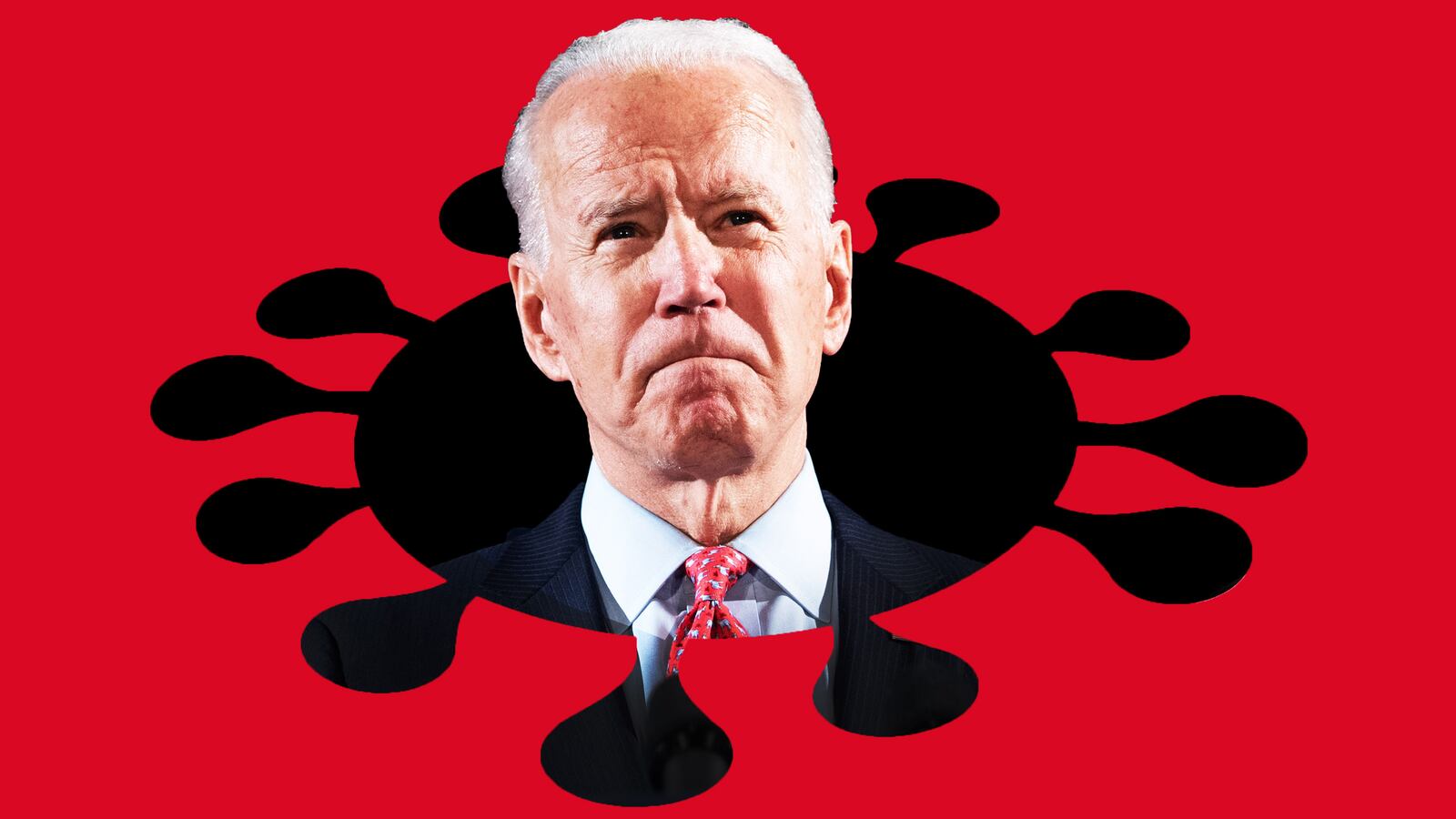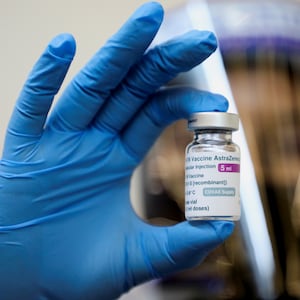Four months after President Joe Biden announced an unprecedented vaccination rollout plan to return American life to semi-normalcy by Independence Day, he was back at a podium pleading with the percentage of the country that decided long ago to ignore him.
The nation has fallen short of Biden’s dreams of 70 percent vaccinations for American adults by July 4, however, the president announced on Tuesday a redoubling of efforts to convince millions of vaccine-hesitant people to get shots in arms.
“Please get vaccinated now!” Biden said on Tuesday in remarks outlining a five-pronged plan to expand vaccinations into communities that remain vulnerable to the coronavirus. “It works, it’s free, and it’s never been easier, and it’s never been more important. Do it now, for yourself and for the people you care about.”
But as the highly infectious and apparently more virulent delta variant spreads in the United States and as hospitalization and infection rates rise in undervaccinated communities, public health experts and former government officials told The Daily Beast that they’re increasingly concerned that there may not be enough tools at the president’s disposal to address the root causes of vaccine hesitancy.
“I don’t know what more can be done,” said Dr. Arnold Monto, a professor of epidemiology and global health at the University of Michigan and a former adviser to the World Health Organization. “There is really no valid reason to say that these vaccines are not safe, given the fact that they’ve been used for so long, with a limited number of clear side effects… and yet people are not vaccinated.”
And viruses, Monto warned, “have a way of finding the susceptible.”
The most obvious problem regarding those most militantly resistant to vaccinations is also one effectively untouched in Biden’s speech and plan: the fact that vaccination status has become as polarized politically as cable news viewership. According to a Washington Post-ABC News survey released moments after Biden’s address, 98 percent of Democrats are either vaccinated or intend to be. Among Republicans, that number drops to only 49 percent.
“We are so polarized in this country,” said Kathleen Sebelius, a former Health and Human Services Secretary under President Barack Obama, who noted that for the first time in her lifetime public health has become a partisan issue.
“Our Democratic governor says one thing and immediately the Republican legislature feels they have to oppose it and fight about it, and that has made every effort over the last year a very partisan battle,” added Sebelius, a former two-term governor of Kansas, a state where less than 40 percent of residents have been completely vaccinated. Meanwhile, neighboring state Missouri—where less than one in four residents is fully vaccinated—is gripped by the biggest outbreak of the delta variant in the country, with hospitals running out of ventilators and personnel.
Sebelius said that she hoped the administration’s plan—which she wholeheartedly supports, particularly in regards to ensuring that family physicians can help spread the word about the safety and efficacy of the vaccine—will also include greater responsibility for state and local Republican leaders who might have demurred on vaccines in the past.
“That can be done out loud and it can be done very quietly, but that has to happen to get some of these Republican governors to take what’s happening in their own states very seriously,” Sebelius said.
On Tuesday, Biden announced five areas where the federal government will create or strengthen programs intended to specifically target states, communities and individuals who have not yet received a coronavirus vaccination. The plan, coordinated with state and local leaders, health officials and physicians, is intended to bring America “closer than ever to declaring our independence from this deadly virus,” Biden said.
“We need to go community by community, neighborhood by neighborhood, and oft times door-to-door, literally knocking on doors,” Biden continued, standing in front of a backdrop newly branded with the motto WE CAN DO THIS. “We are emerging from one of the darkest years of our nation’s history… Think about where you were last year. Where you are today... We can’t get complacent now.”
The five areas, previewed for reporters by a White House official ahead of the president’s remarks, include targeted community outreach, increasing the number of vaccine doses provided to primary care physicians so that Americans can get shots from a trusted doctor, increasing those efforts for pediatricians as well in order to reach younger patients, working with employers to provide vaccinations at workplaces with paid time off for any side effects, and and increasing funding for mobile clinics for remote communities.
“Overall, the president's plan is very strong,” said Professor Larry Gostin, director of the O’Neill Institute for National and Global Health Law at Georgetown Law Center. “The key is to make the vaccine so convenient and accessible that it covers everyone who is not adamantly opposed to vaccinations.”
But the cohort of those adamantly opposed to vaccinations, noted Dr. Timothy Brewer, a professor of epidemiology at UCLA’s Fielding School of Public Health and of Medicine, is too large to ignore.
The steps outlined by the president “are all reasonable,” said Brewer, “but unlikely to make much of a difference for those choosing not to be vaccinated.”
As a Democratic president, public health experts said, Biden is not in the best position to reach those people—many of whom falsely think that he was installed in office illegally, and many of whom are predisposed to believe pseudoscience alleging that the vaccines are untested, unsafe, or untrustworthy.
“To improve vaccination rates in these communities and among these individuals, trusted opinion leaders or colleagues need to be encouraging vaccination and sufficiently informed to be able to address concerns,” Brewer said. “These persons could be entertainers, sports figures, religious leaders, family or others that individuals hesitant or unwilling to be vaccinated still respect and listen to.”
Ahead of the president’s remarks, White House press secretary Jen Psaki told reporters that similar programs aimed at persuading vaccine skeptics are clearly working, judging by the fact that the number of American adults who say that they will not get vaccinated has gone down in recent months. But Psaki admitted that the decision to get vaccinated (which should be an easy one) is ultimately up to individuals.
“We don’t have the luxury of feeling frustrated or feeling upset about individuals not getting the vaccine,” Psaki said. “It is ultimately up to individuals, and we certainly recognize that as well, but we are going to continue to press as hard as we can to use the best practices to continue to increase the vaccination rates around the country.”
But as the nation’s vaccination rate stalls out because people are refusing to get them—meanwhile, international scarcity of inoculations in countries that desperately need them has forced other nations back into lockdown protocols—there is a question of diminishing returns as the country continues to invest in vaccination programs intended to cajole people who refuse to get them.
One potential route that hasn’t yet been publicly explored, Sebelius said, is the impending opening of public schools—a matter of enormous practical, political and economic importance to state leaders across the political spectrum. If rising COVID-19 cases due to unvaccinated populations threaten school reopenings, she said, it could force more conservative leaders to start advocating forcefully for shots in arms.
“We may need to look at school reopenings as an opportunity to really ramp up those vaccine numbers, particularly among younger adults who are eligible,” Sebelius said. “The worst thing would be to for schools to reopen, to have lots of people show up, teachers and staff and children who are not vaccinated, and then have huge outbreaks in school settings. That would be a terrible place for America to be.”
But at the end of the day, Monto said, public health is about public education—which means that chipping away at the last remaining chunk of society that believes vaccines will make you magnetic is still crucial, even as it gets harder the more you do it.
“President Trump hid the fact that he was vaccinated,” Monto said. “So that tells you something.”







